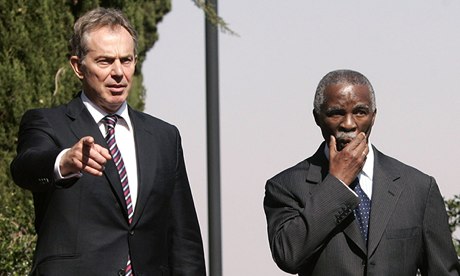
TONY Blair has denied ever planning to intervene in Zimbabwe and topple President Robert Mugabe after Thabo Mbeki, South Africa’s former president, claimed that he was asked to help such an operation.
Telegraph.co.uk
The former British Prime Minister took the unusual step of denying Mbeki’s version of events, recounted in an interview with al-Jazeera.
When Zimbabwe sank into economic collapse and political repression in 2000, South Africa and Britain had starkly different views over how to respond. Mbeki favoured a negotiated settlement; Blair wanted Mugabe to go.
“The problem was, we were speaking from different positions,” remembered Mbeki.
“There were other people saying ‘yes, indeed there are political problems, economic problems, the best way to solve them is regime change. So Mugabe must go’. This was the difference. So they said ‘Mugabe must go’. But we said ‘Mugabe is part of the solution to this problem’.”
Mbeki recalled that Lord Guthrie, who was Chief of the Defence Staff throughout Blair’s first government, said in 2007 that “people were always trying to get me to look at” the option of toppling Mugabe by force.
Lord Guthrie did not say whether these requests had come from Blair himself. In any event, Lord Guthrie said that his advice was: “Hold hard, you’ll make it worse” — suggesting that the idea was never a serious proposition.
- Chamisa under fire over US$120K donation
- Mavhunga puts DeMbare into Chibuku quarterfinals
- Pension funds bet on Cabora Bassa oilfields
- Councils defy govt fire tender directive
Keep Reading
But Mbeki noted: “There is a retired chief of the British armed forces and (he) said that he had to withstand pressure from the then Prime Minister of the United Kingdom, Tony Blair, who was saying to the chief of the British armed forces, ‘you must work out a military plan so we that can physically remove Robert Mugabe’.”
Mbeki said that was no surprise. “We knew that, because we had come under the same pressure and that we needed to co-operate in some scheme — it was a regime change scheme — even to the point of using military force, and we said ‘no’.”
However, a spokesman for the former Prime Minister said: “Tony Blair has long believed that Zimbabwe would be much better off without Robert Mugabe and always argued for a tougher stance against him, but he never asked anyone to plan or take part in any such military intervention.”
In 2000 and 2001, Mugabe repeatedly accused Britain of plotting not only to overthrow his regime, but also to re-colonise Zimbabwe.
At various points, he claimed that Britain had sent “hit squads” to assassinate his Cabinet — and deployed warships to intercept Zimbabwe’s fuel supplies on the high seas.
This became a central pillar of his rhetoric as he tried to rally support against a new opposition party, the Movement for Democratic Change.
State television reported in 2000 that a British invasion force had been deployed in neighbouring Botswana, implausibly claiming that a naval flotilla was present in the landlocked Okavango Delta.
Blair’s memoirs have no mention of Mbeki — and only fleeting references to Mugabe.
Given that Lord Guthrie declined to look at the idea of intervening, Blair denies asking for any such plans — and no military preparations appear to have been made — it seems unlikely that any British operation was ever a real possibility.







